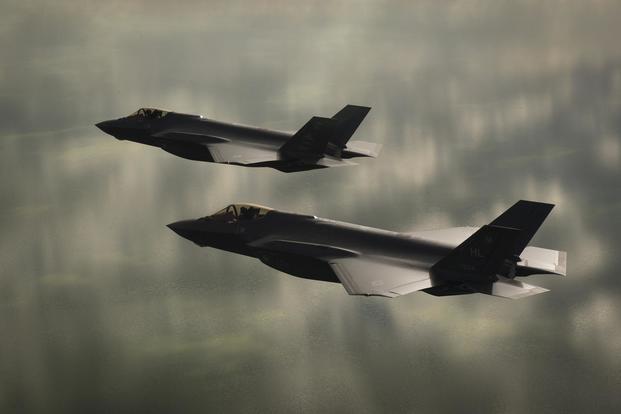Joint Chiefs Chairman Gen. Joseph Dunford said Thursday that it will be difficult to proceed with the sale and delivery of F-35 Joint Strike Fighters to Turkey given Turkey's insistence on acquiring a Russian system designed to shoot them down.
"It's a tough issue," Dunford said, and the U.S. "would have a hard time" justifying the F-35 sale to a nation that has Russia's S-400 advanced anti-air system.
Dunford said he's worked hard to improve relations with NATO-allied Turkey, but the S-400s could be a deal-breaker on the F-35 sale.
"We're hopeful to find a way through this, but it's a tough issue," Dunford said.
In all, Turkey wants to buy 100 of the F-35A variant used by the U.S. Air Force, according to Joint Strike Fighter manufacturer Lockheed Martin Corp. The country took delivery of its first F-35 last June, amid legislative efforts to halt future deliveries.
Reuters reported earlier Thursday that the U.S. was eyeing a freeze in preparations to deliver the F-35 to Turkey in light of the country's efforts to acquire the S-400.
"The S-400 is a computer. The F-35 is a computer. You don't hook your computer to your adversary's computer and that's basically what we would be doing," Katie Wheelbarger, acting assistant secretary of defense for international security affairs, told the news outlet in an interview.
Dunford made the remarks in a question-and-answer session at the Atlantic Council, at which he mainly focused on U.S. efforts to counter the rise of Russia and China.
Dunford said that one of his main concerns was preserving the relationship with Turkey beyond the current dispute over the F-35s and the S-400 systems.
"Turkey is an ally and a very important ally, and we have many more areas of convergence than divergence. As we look at five, ten years down the road, I want to make very sure that our Turkish allies are close to us," Dunford said. "And I worked that relationship very hard. And to that point, I think since I've been chairman, I've made 12 visits to Turkey. I'm not sure I've gone anyplace else even close to that many times."
Regarding Russia and China, Dunford said both countries have been developing new anti-ship cruise missiles, ballistic missiles and other systems designed to prevent or limit the ability of the U.S. to defend allies and project power across the Atlantic and Pacific.
He said that Beijing was aiming to achieve "preeminence, if not hegemony, in the Pacific," and added that China's rulers also "have aspirations beyond the Pacific."
He cited the establishment in 2017 of the Chinese People's Liberation Army's first overseas military base in Djibouti on the Horn of Africa, next to the major base of U.S. Africa Command.
Could the Russians prevent the U.S. from defending NATO allies by moving troops and supplies across the Atlantic?
"The answer is 'No,' they can't," with their existing capabilities, Dunford said. But he added there was "absolutely no question" they could make it more problematic than it was in the past.
"Yes, it would be more difficult to project power to Europe today," Dunford said.
Dunford said he doesn't believe that Russian President Vladimir Putin "has the intent right now to attack a NATO ally," since he would have more to lose than to gain from the response of the alliance and the U.S.
He also said that he does not as yet view Russia as an "adversary" of the U.S. "They're a competitor, that's the way I would describe them," he said.
The term of the 63-year-old Dunford as Joint Chiefs Chairman and principal military advisor to the president expires in October. He gave no indication Thursday that he might step down early. President Donald Trump has already announced his intention to nominate Army Chief of Staff Gen. Mark Milley to succeed him.
-- Hope Hodge Seck contributed to this report.
-- Richard Sisk can be reached at richard.sisk@military.com.










